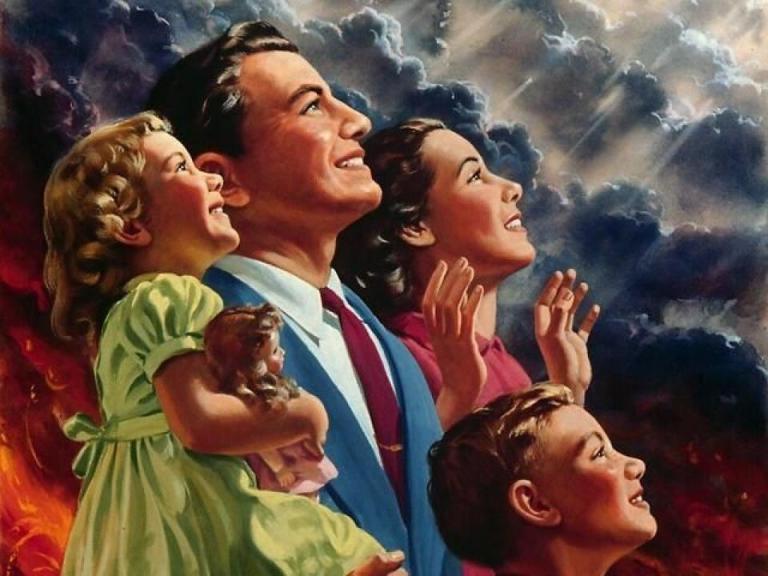Nicolas Cage’s ironically epic remake of Left Behind hits theaters this weekend.
From the moment I first caught wind of its production, I have made plans to see the traveshamockery on opening night and live tweet the entire thing.
Unfortunately, unless miraculous unforeseen childcare comes through at the last moment, I will be the one left behind this weekend.
I’m genuinely sad about this because I’ve been fascinated with the “end times” since I was a kid. Although, the reason for that fascination has radically changed over the years. I’ve gone from pouring over newspaper headlines for clues to the date of the rapture to writing about why the rapture will never, ever happen. My fascination today is less with “discerning the signs” and much more with the phenomenal obsession others continue to have with the book of Revelation and so-called end times prophecy.
So, when someone is willing to sink millions of dollars into producing a movie based on a work of fiction based on a profoundly terrible misunderstanding of ancient literature and then present that movie as a kind of prophetic documentary, you can count me in.
To be fair, the book of Revelation can be difficult to understand simply because there’s nothing really like it today.
People certainly write about the apocalypse today – usually in a very literal, trying to exactly predict the future kind of way – but the sort of apocalyptic literature we see in the ancient world (in the form of texts like Revelation) just doesn’t exist today.
At least not that I’m aware of.
This literary vacuum has unfortunately been filled with the likes of Left Behind, John Hagee, Jack Van Impe, and my personal favorite: The Third Eagle of the Apocalypse.
Ever since John Darby invented the idea of the rapture in the early 19th century, Christians around the world have become increasingly obsessed with the idea that Revelation is actually a secret codebook that once unlocked will reveal every detail about the end of the world.
200 years post-Darby we’ve become so indoctrinated with this sort of Left Behind theology that we can’t read Revelation or even understand the Second Coming as anything other than the story of an ass-kicking, name-taking Jesus who’s come back to finish what he started.
Rather than doing the hard work required to understand an ancient text written to ancient people in a particular culture (and in doing so risk discovering that Revelation might be more about worship and restorationthan wrath and destruction), we treat Revelation like a biblically ordained correction to the wimpy gospel Jesus we don’t want to admit we really don’t like.
But when we force Revelation to be something it’s not (a literal text about a literal future), we only ever end up creating a Jesus in our own image who fulfills all our dreams while simultaneously satisfying our deepest bloodlust.
Not surprisingly, this new Jesus looks conspicuously different than the Jesus we encounter in the gospels.
In the gospels we meet a Jesus who tell us to be prepared for persecution and death, but our Revelation version of Jesus stands ready to snatch us away from danger.
The gospel Jesus arrives humble, laying in a manger with no place to lay his head, but our Revelation Jesus greets with keys to the mansions of our dreams.
The gospel Jesus says he will leave the 99 behind in search of one lost sheep, but our Revelation Jesus eagerly awaits the moment when he can damn the lost to hell.
The gospel Jesus calls us to love our enemies, turn the other cheek, and put away the sword, but our Revelation Jesus is the action hero we always wanted him to be – the who who totally obliterates our enemies.
Simply put, when Revelation gets the Left Behind treatment, the gospels get rewritten and Jesus stops being Jesus.
At least the sort of Jesus proclaimed by Matthew, Mark, Luke, and John.
When that happens, Revelation itself becomes anti-Christ.
We may never think about it that way and we would certainly never articulate it quite like that, but our obsession with everything end times reveals a theology in which our version of Revelation trumps everything else. In our Left Behind world it’s as if the gospel Jesus does all the hard stuff so we don’t have to. All we need do is await the arrival of Revelation Jesus who will make all of our wildest fantasies come true.
And if we’re being really, really honest, I think most of us look forward to the Second Coming because we want Revelation Jesus to finally release the valve on all our pent up vengeance and exact brutal revenge against our enemies.
In the midst of our holy bloodlust we forget the prophetic words of Jürgen Moltmann,
The message of the new righteousness which eschatological faith brings into the world says that in fact the executioners will not finally triumph over their victims. It also says that in the end the victims will not triumph over their executioners. The one will triumph who first died for the victims and then also for the executioners, and in so doing revealed a new righteousness which breaks through the vicious circles of hate and vengeance and which from the lost victims and executioners creates a new mankind with a new humanity. Only where righteousness becomes creative and creates right both for the lawless and for those outside the law, only where creative love changes what is hateful and deserving of hate, only where the new man is born who is neither oppressed nor oppresses others, can one speak of the true revolution of righteousness and of the righteousness of God. – The Crucified God
, pg. 178
Ultimately, our love for the end times says just as much about us as it does about what we think about Jesus.
You see, when we look at the heart of our Left Behind theology – escapism, destruction, and vengeance – our obsession with the end times reveals a deep love for self, a profound disinterest in affairs of the world, and fundamental and intractable hate for our enemies..
This sort of attitude is, of course, profoundly anti-biblical, to say nothing of being anti-Christ. For the Bible is the story of a selfless God who is deeply interested in world of the here and now, so much so that God puts on flesh and dies so that this world, the world of God’s enemies can be made new.
Interestingly, the biblical definition of antichrist isn’t always singular. Sometimes, like in 1 John 2, we are warned that many antichrists have already come in the form of those who stand opposed to the truth of the gospel and the Jesus it proclaims.
Which means if we refuse to give up our Left Behind theology and continue to insist on discerning the signs of the times, then perhaps our apocalyptic work is actually a little easier than we realized.
For, instead of scanning newspaper headlines for clues about the identity of the antichrist, we may just need to look in the mirror.













